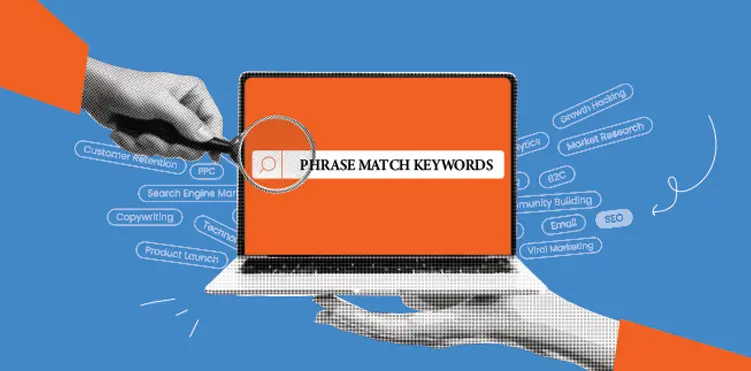Phrase Match Keywords is a keyword-matching option in Google Ads that allows your ads to appear for designated phrases and their close variants. The ads also appear for searches even if there are words before or after the phrase. The flexibility that comes with incorporating close variants like misspellings, synonyms, abbreviations, etc. enables more chances of your ad reaching a wider range of your target audience. The phrase match keywords are usually defined using quotation marks (eg. “digital marketing agency”). Below are a few more examples to understand this further.
If your chosen phrase is “digital marketing agency,” your ads will appear for related searches such as “best digital marketing agency,” “digital marketing agency near me,” and “best digital marketing agency in Bangalore,” ensuring broader reach and relevance. However, the ads wouldn’t show up for searches like marketing agencies for digital services, agencies that offer digital solutions, etc. The intent behind maintaining the logical order of words is to ensure your ads show up only for the right audience.
How Phrase Match Keywords Work?
Phrase match keywords bring in a middle ground which helps in enhancing precise targeting without having to compromise on reach. When provided in quotation marks, Google understands that the exact phrase of its close variants is what you are targeting.
The close variations include plurals, abbreviations, and synonyms whereas searches that preserve the intent include searches that maintain the meaning of the phrase. Searches that alter the phrase’s meaning or order of words are often excluded in such situations. Below is the comparison of match types:
- Broad Match: Ads shown to people who search for related keywords. It often attracts more irrelevant traffic and is a waste of money.
- Exact Match: Ads appear to people who search for the exact keywords. This might lead to missing potential traffic and thus missing impressions.
- Phrase Match: Ads displayed to people who search for the phrase and its variations. It brings a balance to relevancy and reach.
| Match Type | How it works | Examples | Targeting |
|---|---|---|---|
| Broad Match | Ads appear for related terms, synonyms, and loosely connected words. | Keyword: “digital marketing company” Ads appear for “firm for digital marketing”, ”digital solutions” |
Wider audience |
| Phrase Match | Ads appear for the exact phrase in the same order. (accommodates words before or after) | Keyword: “digital marketing company” Ads appear for “best digital marketing company”, “digital marketing company near me” |
Precise targeting with intent and flexibility |
| Exact Match | Ads appear for exact keywords and close variants. | Keyword: “digital marketing company” Ads appear for “digital marketing company”, “digital marketing companies” |
Precise targeting |
Benefits of Using Phrase Keywords
If you are a business looking for reach, visibility, or conversions, phrase keywords are the best. Wondering why? Here are the benefits of phrase-match keywords in your Google Ads campaigns.
- Improved Targeting: Phrase match keywords ensure that your ads appear for search queries that are close to what your target audience is looking for. Your ads will be visible to more users who are genuinely interested in your offerings. This, in turn, helps in reducing irrelevant impressions and attracting customers who are more likely to convert.
- Higher CTR: Precise targeting helps in higher Click-Through Rates (CTR). When you target the right search queries, it helps in improving relevance and chances of engagement. Moreover, Google rewards higher CTR with quality scores which ensures better ad placement and lower ad costs.
- Cost-Efficiency: When you avoid irrelevant traffic, you save a lot on ad spend. In fact, it is one of the most efficient ways to maximise your ad budget. Using bidding strategies like Enhanced Cost Per Click (eCPC) along with phrase match further optimises bids for high-performing queries.
- Flexibility: The flexibility offered by phrase match is commendable. Since phrase match offers keyword variations, managing campaigns without an extensive keyword list is possible. One well-targeted phrase will incorporate a wide range of long-tail variations of the same phrase, simplifying campaign management.
When To Use Phrase Match Keywords?
Below are a few scenarios where phrase-match keywords are most effective.
- Word Order in Search Queries: Phrase match keywords work best for queries where the word order significantly impacts the meaning. For instance, if your phrase is “SEM agency in Bangalore,” your ad won’t appear for searches like “agencies offering digital solutions,” as the intent behind this query differs from your targeted phrase.
- Targeting Niche Audiences: If you are well aware of your target audience, phrase match keywords allow you to connect with those users with specific intents. If you have a product or service with a defined buyer persona, phrase-match keywords are your best bet to connect with your niche audience.
- Campaign Refinements: When you analyse your broad match keyword data, you will be able to find the best-performing keywords. You can add those as phrases to fine-tune your ad strategy. This way you could efficiently avoid many irrelevant clicks while optimising and refining your targeting for better results without compromising on reach.
Best Practices For Implementing Phrase Match Keywords
If you are wondering how to make maximum use of the phrase match keyword strategy, here’s how. Follow the below practices to leverage the power of phrase match keywords for optimal benefits.
- Keyword Research: Conducting thorough research using tools like Google Keyword Planner or other analytics platforms helps identify high-intent search queries that can be made into relevant phrases. Understand how customers search for your products or services and generate phrases accordingly to achieve your campaign goals.
- Negative Keywords: Make sure to eliminate irrelevant keywords to avoid your ads popping up for unrelated search queries. This helps in fine-tuning your targeting and eliminating the chances of wasting money on ad spend.
- Ad Copy Optimisation: It is important to align your ad copy with the exact intent of your phrase match keyword. It helps in enhancing relevance and impact, which, in turn, helps in improving CTR and conversions.
- Monitor Campaigns: Regularly monitor the key metrics like CTR, conversion rates, and manual CPC (Cost Per Click). Refine your bids accordingly and exclude underperforming keywords to achieve optimal control over spend and best results.
Challenges and Limitations
Although highly powerful, phrase-match keywords come with certain challenges too.
- Overlapping: If the negative keywords are not configured efficiently, there is a slight chance of phrase match keywords getting overlapped with broad match keywords. Such misinterpretations of the intended phrase’s meaning may cause irrelevant impressions.
- Stricter targeting: While relevance stands as one of the major benefits of phrase-match keywords, because of stricter targeting, some long-tail opportunities or beneficial variations can get excluded, which, in turn, might limit the reach.
- Dependency on Google Algorithm: As Google Ads is ever-evolving, Google’s interpretation of close variants and synonyms might also keep changing. This dependency on Google can result in unintended matches.
The key to phrase match keywords is finding the right phrase. And, to find the right phrase, one must understand the nuances of customer behaviour and intent. As the best SEM agency in Bangalore, ODigMa has proven excellence in finding the right phrase match keywords that cater to specific audiences effectively. Achieve the perfect balance between broad match and precise targeting while maintaining a healthy ad spend with ODigMa.
If you are looking for a paid media expert, reach out to us now!
Frequently Asked Questions
1. How do phrase match keywords differ from broad match and exact match?
Phrase match keywords are not as extensive as a broad match but not as restrictive as an exact match. Phrase match offers a middle ground.
2. How do I set up phrase-match keywords in a Google Ads campaign?
You can set up phrase-match keywords in Google Ads campaigns by using quotation marks around the keyword you intend to phrase while adding it to your keyword list. Eg. “SEM agency in Bangalore”
3. What are some examples of phrase-match keywords?
Some examples of phrase-match keywords are:
- “digital marketing agency in Bangalore”
- “affordable luxury homes in Whitefield”
- “best SEM company near me”
4. When should I use phrase match keywords over other match types?
Use phrase match keywords over other match types when word order in a phrase matters and when you are targeting audiences with specific intent.
5. Do phrase-match keywords include synonyms and close variants?
Yes. Phrase match keywords include close variants such as plurals, synonyms, abbreviations, etc.
6. How has the functionality of phrase match changed in recent updates?
Google has improved in terms of interpreting phrase match to match with user intent. This allows Google to accommodate more variations than before.
7. What are the advantages of using phrase-match keywords in PPC campaigns?
The advantages of phrase match include high-quality traffic, better CTRs, and optimised ad spending while enabling a flexible targeting strategy.


 Enhanced Cost Per Click (e-CPC): An Improved Bidding Strategy For Your Campaigns
Enhanced Cost Per Click (e-CPC): An Improved Bidding Strategy For Your Campaigns Phrase Match Keywords: The Targeting Strategy You Need
Phrase Match Keywords: The Targeting Strategy You Need Decoding Digital Success Through Content Research and Analysis
Decoding Digital Success Through Content Research and Analysis SWOT Analysis In Digital Marketing
SWOT Analysis In Digital Marketing Why Is ORM In Digital Marketing As Important As Other Services?
Why Is ORM In Digital Marketing As Important As Other Services?